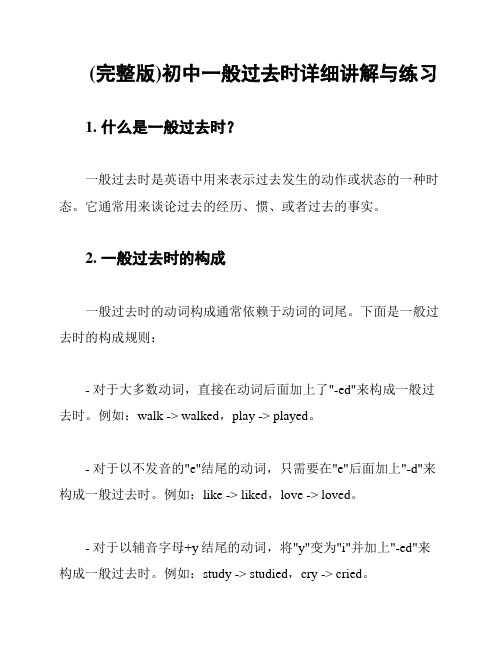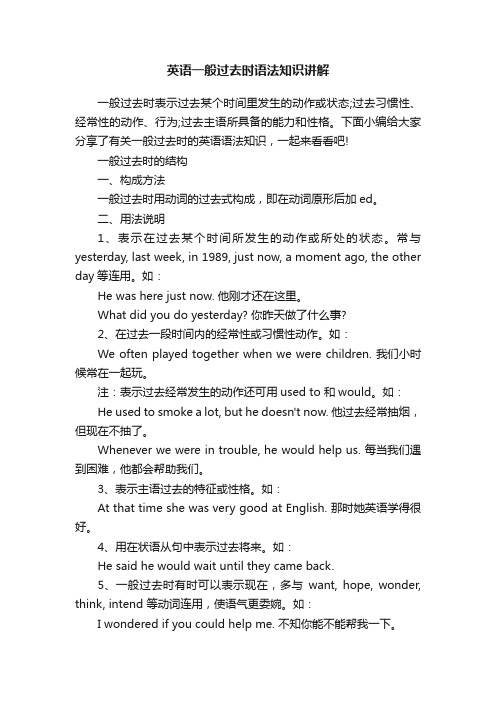一般过去时精讲
2025届高考英语语法复习一般过去时知识讲解讲义

高考英语一般过去时知识讲解一、结构和用法在英语学习中,时态的掌握是至关重要的一环。
其中,一般过去时作为描述过去发生的动作或存在的状态的时态,具有其独特的结构和用法。
(一)一般过去时的结构1、肯定形式结构:主语 + 动词过去式 + 其他例句:She went to the park yesterday.她昨天去了公园。
规则动词过去式的构成:一般在动词原形末尾直接加上-ed,如:look looked。
以不发音的字母e结尾的动词,去e再加-ed,如:live lived。
末尾只有一个辅音字母的重读闭音节(辅元辅结构),先双写这个辅音字母,再加-ed,如:stop stopped。
末尾是辅音字母+y结尾的动词,先变y为i,然后再加-ed,如:study studied。
2、否定形式结构1:主语 + was/were + not + 其他(be动词的否定)例句:He wasn't at home this morning.他今天早上没在家。
结构2:主语 + didn't + 动词原形 + 其他(行为动词的否定)例句:I didn't know you like coffee.我之前不知道你喜欢喝咖啡。
3、一般疑问句结构1:Did + 主语 + 动词原形 + 其他?例句:Did you go to Beijing last week? 你们上周去北京了吗?结构2:Was/Were + 主语 + 表语?例句:Were you a student 10 years ago?10年前你是学生吗?4、一般过去时的特殊疑问句的构成结构:疑问词 + did + 主语 + 动词原形 + 其他?例句:What did you do last night?昨天晚上你做了什么?常见的特殊疑问词有:who, what, whose, which, when, where, why, how, how long, how much等。
一般现在时和一般过去时精讲+练习题

一、一般现在时(一)概念:表示经常性或习惯性的动作,或存在的状态1、肯定句:主语+谓语+其他。
She reads English everyday .2、否定句:主语+don’t/doesn’t+谓语+其他。
He doesn’t get up at 6:30 in the morning .3、一般疑问句:Do/Does+主语+V原+其他?Do you like English ? Yes, I do. /No, I don’t .4、特殊疑问句:特殊疑问词+do/does+主语+V原+其他?What time do you get up every morning ?Where does your father work ?(四)具体用法1、表示经常性或习惯性的动作,或存在的状态,常与表示频率的时间状语如:often , sometimes , usually,always , seldom,never, every day /year/month...), once/twice a week (month , year , etc.) , on Sundays等连用。
I leave home for school at seven every morning .2、在以when,if, as soon as, as long as等连词引导的从句中,当主句的谓语动词是一般将来时,那么从句的谓语动词通常用一般现在时来表示将来要发生的动作。
(主将从现)I'll tell him the news when he comes back. 他回来时,我将告诉他这个消息。
If you come this afternoon,we’ll have a meeting.今天下午如果你来,我们就开个会。
3、描述事物的状态、性质、特征等,例如:The door is open. 门是开着的。
The apple is sweet.这个苹果是甜的。
(完整版)初中一般过去时详细讲解与练习

(完整版)初中一般过去时详细讲解与练习1. 什么是一般过去时?一般过去时是英语中用来表示过去发生的动作或状态的一种时态。
它通常用来谈论过去的经历、惯、或者过去的事实。
2. 一般过去时的构成一般过去时的动词构成通常依赖于动词的词尾。
下面是一般过去时的构成规则:- 对于大多数动词,直接在动词后面加上了"-ed"来构成一般过去时。
例如:walk -> walked,play -> played。
- 对于以不发音的"e"结尾的动词,只需要在"e"后面加上"-d"来构成一般过去时。
例如:like -> liked,love -> loved。
- 对于以辅音字母+y结尾的动词,将"y"变为"i"并加上"-ed"来构成一般过去时。
例如:study -> studied,cry -> cried。
- 部分动词的一般过去时需要进行不规则变化。
例如:go -> went,eat -> ate。
3. 一般过去时的用法一般过去时通常用来描述以下情况:- 过去发生的动作:I walked to school yesterday.- 过去的经历:He lived in London for five years.- 过去的事实:She was a teacher in the past.4. 一般过去时的句型练下面是一些练,帮助加深对一般过去时的理解和运用:1. 请用一般过去时填空:Yesterday, I ________ (watch) a movie at home.2. 完成句子:He _____ (visit) his grandparents last summer.3. 改写句子,使用一般过去时:I read a book yesterday. (改为否定句)4. 改写句子,使用一般过去时:They played basketball in the park. (改为疑问句)5. 总结一般过去时是用来表示过去发生的动作或状态的一种时态。
小学英语知识点-一般过去式解析

英语知识点1、概述一般过去时表示过去某个时间发生的动作或状态,常和表示过去的时间连用,yesterday,last night, in 1990,two days ago等。
也表示过去经常或反复发生的动作,常和often, always等表示频度的时间状语连用。
I got up at 6:30 yesterday。
我昨天6:30起床.He always went to work by bus last year。
去年他总是坐公交车上班。
2、一般过去时的构成一般过去时由规则动词(—ed/—d)或不规则动词的过去时表示,除be外,其余动词没有人称和数的变化。
各种动词的否定结构和一般疑问结构,与一般现在时的否定结构和疑问结构相同。
3.Be动词在一般过去时中的变化:⑴am 和is在一般过去时中变为was。
(was not=wasn't)⑵are在一般过去时中变为were。
(were not=weren’t)⑶带有was或were的句子,其否定、疑问的变化和is, am, are一样,即否定句在was或were后加not,一般疑问句把was或were调到句首。
4.句中没有be动词的一般过去时的句子否定句:didn't +动词原形,如:Jim didn’t go home yesterday。
一般疑问句:在句首加did,句子中的动词过去式变回原形。
如:Did Jim go home yesterday?特殊疑问句:⑴疑问词+did+主语+动词原形?如: What did Jim do yesterday?⑵疑问词当主语时:疑问词+动词过去式?如:Who went to home yesterday?5。
规则动词过去式变化规则(1).一般在动词末尾加—ed,如:play-played, cook—cooked(2).结尾是e加d,如:like—liked love—love(3).末尾只有一个元音字母和一个辅音字母的重读闭音节,应双写末尾的辅音字母,再加—ed,如:stop—stopped(4).以“辅音字母+y”结尾的,变y为i,再加-ed,如:study—studied6、一般过去时的用法(1)表示过去某个特定时间发生的动作或存在的状态常有明确的时间状语,如yesterday,last night,some years ago,in1890等,以及由when 等引导的时间状语从句.Tom didn't come to class yesterday.汤姆昨天没来上课。
小学英语一般过去时专题讲解

小学英语一般过去时专题讲解小学英语一般过去时专题讲解一、一般过去时的定义一般过去时表示过去某个时间发生的动作或存在的状态,通常与表示过去的时间状语连用,如yesterday、last night、in 1990、two days ago等。
例如:I was at the zoo XXX.I went to bed at XXX.此外,一般过去时还可以表示过去经常或反复发生的动作,通常与表示频度的时间状语连用。
例如:When I was a child。
I often XXX.My father often drove to work last year.二、一般过去时的构成1.在表示某个时间里存在的状态,构成为主语+be的过去式(was。
were)+其他。
be的过去式的用法是:was用于I、he、she、it,而复数形式we、you、they全部使用were。
例如:I was at home XXX.We were in the gym just now.2.在表示过去某个时间里发生的动作,构成为主语+动词的过去式+其他。
例如:XXX.XXX.动词过去式变化规则:1.一般在动词末尾加-ed,如wash — washed,play —played。
2.结尾是e加d,如dance — danced,love — loved,live — lived。
3.以“辅音字母+y”结尾的,变y为i,再加-ed,如carry — carried,study — studied。
4.末尾只有一个元音字母和一个辅音字母的重读闭音节,应双写末尾的辅音字母,再加-ed,ped。
5.不规则动词过去式:(注:除去不规则变化动词,其他动词都是规则变化)例如:XXX.She ran in the park this morning.They bought some food at the supermarket.过去式madewrotedrewflewrodespoke四、一般过去时态的“三变”技巧一变:肯定句变为否定句当句中含有情态动词或助动词could,would等时,可直接在其后面加not构成否定句。
英语一般过去时语法知识讲解

英语一般过去时语法知识讲解一般过去时表示过去某个时间里发生的动作或状态;过去习惯性、经常性的动作、行为;过去主语所具备的能力和性格。
下面小编给大家分享了有关一般过去时的英语语法知识,一起来看看吧!一般过去时的结构一、构成方法一般过去时用动词的过去式构成,即在动词原形后加ed。
二、用法说明1、表示在过去某个时间所发生的动作或所处的状态。
常与yesterday, last week, in 1989, just now, a moment ago, the other day等连用。
如:He was here just now. 他刚才还在这里。
What did you do yesterday? 你昨天做了什么事?2、在过去一段时间内的经常性或习惯性动作。
如:We often played together when we were children. 我们小时候常在一起玩。
注:表示过去经常发生的动作还可用used to 和would。
如:He used to smoke a lot, but he doesn't now. 他过去经常抽烟,但现在不抽了。
Whenever we were in trouble, he would help us. 每当我们遇到困难,他都会帮助我们。
3、表示主语过去的特征或性格。
如:At that time she was very good at English. 那时她英语学得很好。
4、用在状语从句中表示过去将来。
如:He said he would wait until they came back.5、一般过去时有时可以表示现在,多与want, hope, wonder, think, intend 等动词连用,使语气更委婉。
如:I wondered if you could help me. 不知你能不能帮我一下。
6、有时用一般过去时也是时态一致的需要。
一般过去时精讲
一般过去时常用句式转换:1、He played basketball on the playground yesterday.昨天他在操场上打篮球。
(变成否定句)→He didn’t play basketball on the playground yesterday.【在主语和谓语动词之间加didn’t,谓语动词由过去时形式变成动词原形。
】2、He played basketball on the playground yesterday.变成一般疑问句→Did he play basketball on the playground yesterday.【在原句前加上助动词did,谓语动词由过去时变成动词原形。
】3、He played basketball on the playground yesterday.画线提问→What did he play on the playground yesterday?【分两步来做:一是先选准特殊疑问词,二是把剩下的部分变成一般疑问句。
】4、He played basketball on the playground yesterday.画线提问→Where did he play basketball yesterday?【分两步来做:一是先选准特殊疑问词,二是把剩下的部分变成一般疑问句。
】5、He played basketball on the playground yesterday.画线提问→When did he play basketball on the playground?【分两步来做:一是先选准特殊疑问词,二是把剩下的部分变成一般疑问句。
】6、He played basketball on the playground yesterday.画线提问→What did he do on the playground yesterday?【此题提问的是谓语动词及其宾语,用特殊疑问词what来提问,后面紧跟着助动词did,再加上原句主语,千万要注意,谓语动词处一定要用do,最后加上其它成分。
一般过去时精讲
"Why use my elbow and foot?"
"Well, gosh," replied the mean man, "You're not coming empty-handed, are you?"
build→built,lend→lent, send→sent,spend→spent 2.结尾d变t 如:
ring→rang,sit→sat, drink→drank, sing→sang,swim→swam,begin→began, give→gave 3.遇见i改为a 如:
ride→rode,drive→drove,write→wrote
我上学时每周去看一场电影。
I went to the cinema once a week when I was at school.
我在乡下时经常在河边散步。(contryside,riverside)
When I was in the countryside, I often walked by the riverside.
ago
4.与one 连用: morning
one afternoon
evening day 5.与that 连用M:ondayatafttheartnotoinme
morning
that day
winter year
6.与in 连用: in 1980 in those days in the old days
“为什么要用我的肘和脚呢?” "Why use my elbow and foot?"
初中一般过去时--精讲
他每天都吃水果。
He __h_as__ fruit every day.
昨天他吃了3个苹果。
He _h_a_d__ 3 apples yesterday.
have/ has
had
go
ቤተ መጻሕፍቲ ባይዱwent
use
think thought live
be
was/ were wake
happen happened keep
give gave
say
become became clean
get got
buy
rain rained play
stay stayed learn
pass passed see
She _d_id_n_’t__pl_a_y_ basketball after school yesterday.
Do you go to school on foot every day? _D_id_ you _g_o to school on foot yesterday.
Does he go to school by bus every day?
stop stopped finish finished
三、一般过去时基本用法
1.表示在过去时间里发生的动作或存在的状态
Liu Jie got up at 7: 10 this morning. He was a student three years ago. 2.表示过去经常或反复发生的动作。 Zhang Yuan always went to school by bike last year. 3.表示已故人所做的事情。
中学英语一般过去时精讲精练
一般过去时
3. 一般疑问句 did + 主语 +行为动词原形 was / were + 主语 +其他成分 eg. - Did you go shopping yesterday? -Yes, I did. / No, I didn’t. -Was she 15 years old last year? 4. 特殊疑问句 特殊疑问词 +did + 主语 +行为动词原形 特殊疑问词 +was / were + 主语 +其他成分 eg. - Did you go shopping yesterday? When and where were you born?
• 4、“辅音字母+y”尾,y改为i, 再
加 -ed。 carry -- carried cry—cried study – studied
过去式加 -ed 的读音
1、在清辅音后,读清辅音 / t / 。
worked / kt / helped / pt / passed / st /washed / t / watched / t /
如hope→hoped love – loved
dance -- danced live→lived live -- lived
• 3、 辅音字母结尾词,重读闭音节
先双写,然后才能加-ed. 如: stop→stopped plan(计划) →planneddrop -- dropped beg -begged
2、在浊辅音和元音后,读浊辅音 / d / 。played / d / carried / id / answered / d / lived / vd / used / zd / called / ld / 3、在 / t, d / 音后面, 读 / id / 。
- 1、下载文档前请自行甄别文档内容的完整性,平台不提供额外的编辑、内容补充、找答案等附加服务。
- 2、"仅部分预览"的文档,不可在线预览部分如存在完整性等问题,可反馈申请退款(可完整预览的文档不适用该条件!)。
- 3、如文档侵犯您的权益,请联系客服反馈,我们会尽快为您处理(人工客服工作时间:9:00-18:30)。
一般过去时一、一般过去时的定义1. 表示过去某个时间发生的动作或存在的状态,常和表示过去的时间状语连用,如:yesterday, last night, in 1990, two days ago 等;I was at the zoo yesterday.I went to bed at eleven last night.2. 表示过去经常或反复发生的动作,常和表示频度的时间状语连用。
When I was a child, I often played football in the street.My father often drove to work last year.二、一般过去时的构成1. 在表示某个时间里存在的状态主语+be的过去式(was, were)+其它。
Be的过去式的用法: was用于我(I)、他(he)、她(she) 、它(it),复数(we, you, they)全部都用were.I was at home yesterday.We were in the gym just now.2. 在表示过去某个时间里发生的动作主语+动词的过去式+其它。
★三、动词过去式变化规则:1.一般在动词末尾加-ed,如:wash — _______ play — _______2.结尾是e加d,如:dance — danced love — _____ live —________3.以“辅音字母+y”结尾的,变y为i,再加-ed,如:carry — carried study — _______4.末尾只有一个元音字母和一个辅音字母的重读闭音节,应双写末尾的辅音字母,再加-ed,如:stop-_______5. 不规则动词过去式:(注:除去不规则变化动词,其他动词都是规则变化)四、一般过去时态的“三变”技巧一变:肯定句变为否定句【技巧1】当句中含有情态动词或助动词could,would,等时,可直接在其后面加not构成否定句。
例如:I could get you a book. → I could not / couldn't get you a book.【技巧2】当句中含有系动词was,were 时,可直接在其后加not构成否定句。
例如:I was at home when you called me. → I was not / wasn't at home when you called me.【技巧3】当句中谓语是除情态动词、助动词、系动词was, were以外的动词时,在该动词之前加did not / didn't,动词还原,构成否定句。
例如:The singer sang some Chinese songs. → The singer did not / didn't sing any Chinese songs.二变:陈述句变为一般疑问句【技巧1】移动词语的位置。
将was,were, could,would,should等移到句首。
例如:He could read it. → Could he read it ?【技巧2】添加助动词did。
谓语是除情态动词、助动词、系动词was, were以外的动词时,在主语之前加did,动词还原。
例如:Miss Zhang looked very old. → Did Miss Zhang look very old?三变:陈述句变为特殊疑问句【技巧1】确定疑问词:人who / whom,物what,地点where,时间when / what time,原因why,频率how often,长度how long,距离how far等等。
例如:They gave the mooncake last night. → When did they give the mooncake?【技巧2】辨认结构形式:疑问词+情态动词/助动词/ was / were / did +主语+...? 例如:He played basketball at school yesterday. → Where did he played basketball yesterday?一般过去时用法专练:一、写出下列单词的过去式。
1, look_________ 2,live________ 3,stop________ 4,carry________ 5, hope________ 6.call________ 7,finish_______ 8, are__________ 9,want________ 10,go________ 11,have_______ 12,do__________ 13.want_________ 14.get_______ e______ 16.say_________ 17.see________18.put________ 19. eat___20.take________ 21.read________ 22.is\am___23.watch___24.wash____25.clean___26. buy____27.visit ___28.win ____29.cook____30.let_____31.sit ___32.swim____33. learn___34.sing____35.stand____36.dance____37.cut____38.take____39.climb___40.die ____二、用动词的适当形式填空。
用be动词的适当形式填空1.I _______ at school just now.2.He ________ at the camp last week.3.We ________ students two years ago.4.They ________ on the farm a moment ago.5.Yang Ling ________ eleven years old last year.6.There ________ an apple on the plate yesterday.用行为动词的适当形式填空1. He _________ (live) in Wuxi two years ago.2. The cat ________ (eat) a bird last night.3. We _______ (have) a party last Halloween.4. Nancy ________ (pick) up oranges on the farm last week.5. I ________ (make) a model ship with Mike yesterday.6. They ________ (play) chess in the classroom last PE lesson.7. My mother _______ (cook) a nice food last Spring Festival.8. The girls ________ (sing) and _______ (dance) at the party.三、选择。
()1. —Did you help me clean my room ? —Yes, I .A. didB. doC. does( ) 2. —What did Lisa do yesterday? —She to music .A. listensB. listenC. listened( ) 3. What ____ he _____ yesterday?A. does, doB. do, didC. did, do( ) 4. They books last weekend.A. readB. readedC. look( ) 5. —What did you do last weekend? —I TV.A. sawB. looked atC. watched ( ) 6. Did you swimming last weekend?A.goB. goesC. Went四、句型转换1. It was exciting.否定句:________________________________________________一般疑问句:____________________________________________肯、否定回答:__________________________________________ 2. All the students were very excited.否定句:________________________________________________一般疑问句:____________________________________________肯、否定回答:__________________________________________ 3.He watched TV last night.否定句:________________________________________________一般疑问句:____________________________________________肯、否定回答:__________________________________________课后作业一般现在时与一般过去时综合练习一、单选。
( ) 1. Jenny ____ in an office. Her parents ____in a hospital.A. work; worksB. works; workC. work; are workingD. is working; work ( ) 2. One of the boys_____ a black hat.A. haveB. there isC. there areD. has ( ) 3. We didn’t go shopping because it____ yesterday.A. don’t rainB. didn’t rainC. rainsD. rained ( ) 4. The sun ____in the east and ____in the west.A. rose; setB. rises; setsC. rises, setD. rise; sets ( ) 5. Wang Mei ____ music and often ____ to music.A. like; listenB. likes; listensC. like; are listeningD. liking; listen ( ) 6. Jenny ____ English last night.A. has studyB. studiesC. studyD. studied二、填空。
